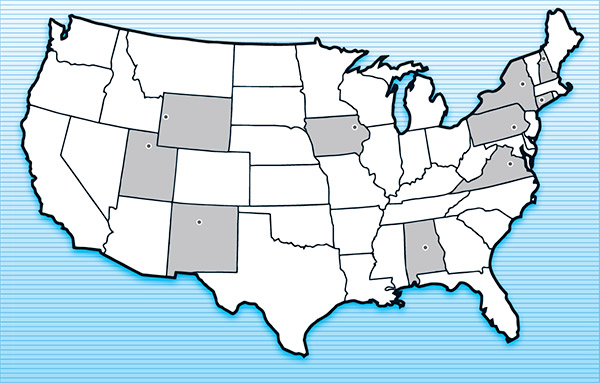AMERICAN MOTORCYCLIST MAY 2019
State and Local Update

Alabama
Legislation that would allow for bigger, heavier all-terrain vehicles in the state died during a special session of the Alabama House, but was reintroduced during the regular legislative session. Bill sponsor Sen. Arthur Orr (R-Decatur) said the bill was introduced at the request of Polaris Industries, which employs about 1,700 people in Orr’s district. The bill would allow ATVs as wide as 60 inches, weighing as much as 1,500 pounds. The Senate version of the bill passed unanimously.
Connecticut
More than 150 dirt bike riders showed up to voice their concern over a proposal that would disrupt riding at Thomaston Dam, the state’s only riding area. Representatives of the AMA and the New England Trail Rider Association urged planners to situate a segment of the planned non-motorized Naugatuck River Greenway Trail east of the Naugatuck River, leaving OHV trails undisturbed.
Iowa
The Delaware County Roads-to-Trails ATV/UTV Club has received a $5,000 grant from the Iowa Department of Natural Resources for the creation of an ATV riding area in a Delaware County park. The club is in partnership with the Delaware County Board of Supervisors and the Delaware County Conservation Board. The grant is expected to pay for a professional designer who would develop a plan for a trail in either Turtle Creek Park or Fountain Springs Park.
New Hampshire
Voters in three New Hampshire towns defeated or delayed petitions calling for a ban on ATVs on town roads. Several towns allow riders to use public streets to access fuel, food and services. The Union Leader reported that Colebrook voters rejected the ban, 227-52. Pittsburg defeated it 166-54. And Stewartstown voted 92-26 to table the matter. Although Chamber of Commerce officials say ATV riders provide a boost to the local economies, some residents object to the presence of ATVs on town roads, particularly near the Ride The Wilds system, which provides 1,000 miles of trails for motorized use. A few have even sued the state to shut down or move the trail system despite trail users contributing greatly to state revenue and property values having increased along the trails since Ride The Wilds opened in 2013. The lawsuit is proceeding in Coos County Superior Court.
Also, H.B. 592 would require anyone operating an OHV on a public highway to be a licensed driver. Currently, those 12 and older who have passed a state safety course may drive OHVs on public roads. If the bill passes, riders would need to be 16 and pass the state motor vehicle driving test. The bill is a request of the State Department of Natural and Cultural Resources, Bureau of Trails.
New Mexico
H.B. 231 would require two license plates or stickers on all registered vehicles. Motorcycles are not excluded in the bill’s language. The bill passed both House committees and awaits consideration on the House floor.
New York
New York Assembly Member Félix W. Ortiz (D-Kings) introduced A.B. 6080, which would exempt all motorcycles from congestion pricing program fees if such a program is adopted. Current and past congestion pricing proposals for New York City would have charged motorcycles the same amounts as cars and trucks. The AMA is urging New York riders to write to their New York State Assembly members in support of this commonsense legislation that recognizes the benefits of motorcycling for city traffic.
Pennsylvania
The state House of Representatives unanimously passed legislation to toughen penalties for operating a motorcycle without the proper license. H.B. 384 would increase the fine from $25 to $200, plus fees and surcharges. Bill sponsor, state Rep. Josh Kail (R-Beaver/Washington), said the state has large numbers of riders operating motorcycles and other vehicles without the proper license, posing a danger to the rider and other motorists and pedestrians. Kail said his legislation would bring the penalty more in line with the seriousness of the violation.
Utah
Utah became the second U.S. state to formally recognize a type of lane splitting, with the governor’s signature on a bill legalizing the filtering of motorcycles between lanes of stopped traffic. H.B. 149 allows motorcyclists traveling no faster than 15 mph to filter between lanes of stopped traffic traveling in the same direction on roads where the speed limit is 45 mph or less.
The bill, sponsored by state Rep. Walt Brooks (R-St. George) and state Sen. David P. Hinkins (R-Orangeville), was signed by Gov. Gary Herbert on March 21. The bill will become law on May 14. There are provisions in the bill automatically repealing the law on July 1, 2022, if the legislature takes no action to extend it.
Also, H.B. 105, signed by the governor, ends reciprocity with other states for OHV permits. Currently, Utah allows OHVs registered in other states to be ridden in Utah.
Wyoming
Forty-four miles of officially recognized motorized trails are planned for the Salt River Range in Wyoming to replace a series of illegal roads and trails used by the OHV community. Officials of the Bridger-Teton National Forest agreed to provide 26 miles of new trails for side-by-sides, 14 miles for dirt bikes and 4 miles for any vehicles. The routes will be closed Dec. 1 to June 30 each year to protect elk habitat during calving and fawning seasons. The new motorized trails and roads will be built in cooperation with the Wyoming Trails Program.
Virginia
The Virginia Senate and House of Delegates passed bills prohibiting motorists from touching their cellphones while driving. The bills would allow the use of hands-free mode.
State law currently prohibits only reading email or text messages or manually entering letters or text in a hand-held personal communications device while driving. It is still legal to operate phones while stopped or while reporting an emergency.
